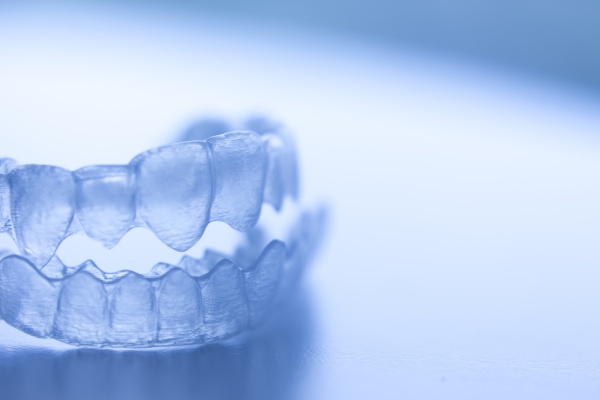Food and Beverage Restrictions When Wearing Invisalign Aligners

Invisalign® aligners are designed to help straighten teeth without the hassle, restriction and expense of traditional braces. One of the benefits of choosing this system is the freedom to eat and drink as normal without making any major dietary changes since there are no prohibited foods or beverages. However, it is critical to follow recommended procedures for eating and drinking, and it may also be beneficial to make some changes to prevent unnecessary discomfort. Making safe and healthy choices can help prevent unnecessary damage to teeth and aligners by steering clear of potentially harmful foods and beverages. The end result may be a straighter smile that is also healthier and stronger than before.
Eating and drinking while using Invisalign®
Invisalign® wearers may be surprised by the lack of required dietary changes compared to those needed when wearing traditional braces. It is important to learn how to approach meal and snack time when using the clear aligners by understanding when it is best to remove them and when it is acceptable to leave them in place. Before meals, snacks or coffee breaks, the aligners should be removed and stored in a safe location. This allows the wearer to enjoy all of their favorite foods and beverages without the risk of damage to the equipment. Teeth should be thoroughly brushed before replacing the aligners to prevent excess decay, irritation and discoloration or stains from prolonged contact with food. Aligners should never be worn when eating or drinking unless the wearer is only consuming clean, pure water.
Food and beverage choices
While there are no restrictions once aligners have been removed, it may be helpful to make a few changes to get the best experience while using aligner trays.
Options to avoid
While it is a more discreet option, Invisalign® is still a dental procedure that causes the teeth to shift and change over time, which may lead to increased sensitivity. It may be best to avoid extremely hot or cold items during treatment, as well as tough, sticky or very crunchy foods. Since aligners should be worn at least 22 hours a day, gum-chewing may no longer be a practical decision.
Options to embrace
Choosing a diet rich in nutritious foods supplemented with plenty of water may help strengthen teeth and gums for a healthier smile during the alignment process. Several foods and drinks have nutritious benefits that are excellent choices for Invisalign® users both during and after treatment. According to the American Dental Association®, the following options are good choices for improved oral health:
- Dairy foods rich in protein and calcium
- Tap water infused with fluoride
- Fruits and vegetables high in fiber for natural teeth cleaning
Conclusion
While Invisalign® users are free to enjoy any food or beverage of their choice, it is important to follow wear and care guidelines for best results. In addition, certain options may cause unwanted irritation while others may help improve teeth and gums.
Are you considering Invisalign® in the New York area? Get more information at https://www.newyorkdentaloffice.com.
Check out what others are saying about our services on Yelp: Read our Yelp reviews.
Recent Posts
A dental practice offers various services to help individuals maintain optimal oral health. Whether for routine cleanings, cosmetic enhancements, or restorative procedures, these services address different aspects of dental care. Regular visits to a dental practice ensure that individuals maintain healthy teeth and gums while addressing any concerns that may arise over time. Below are…
Dental practices work to provide strategies and guidance to individuals for maintaining strong teeth and gums. While brushing and flossing are indispensable habits, the foods and beverages individuals consume each day also influence oral health. Having a firm grasp on food, particularly how it affects oral health, can reduce the risk of tooth decay, enamel…
Cosmetic dental treatments can bring you closer to the smile of your dreams. The main focus of these services is to enhance the appearance of the smile, which in turn boosts confidence. They can even make oral hygiene and care easier, although that is not the primary purpose. Knowing when it is time to consult…
Scheduling an initial visit to a dental practice marks the first step toward maintaining optimal oral health. Proper preparation for this appointment ensures a seamless experience, allowing the dental team to provide the highest-quality care possible. Understanding what documents and information to bring facilitates efficient care, reduces stress, and helps patients feel comfortable and informed…



